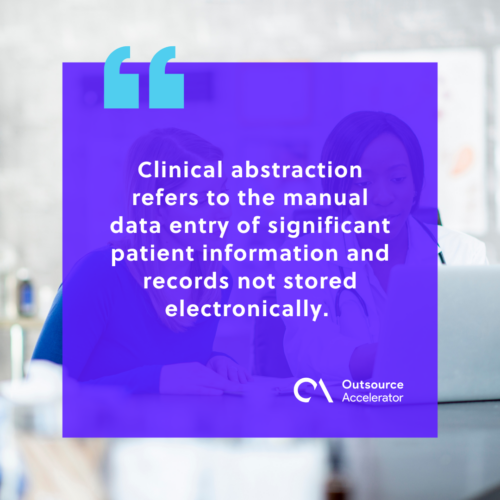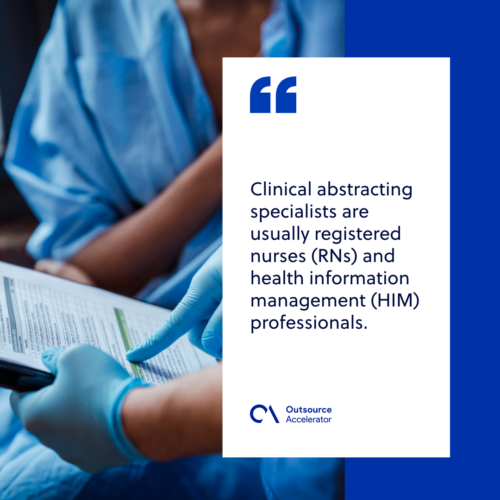Tips for a successful outsourced clinical abstracting process

Digital transformation is the future, and this doesn’t only apply to some parts of the industry sector. Even healthcare is adopting the use of digital technologies to augment their processes.
Medical establishments are aiming for a paperless medical practice by utilizing a centralized electronic health record (EHR) system, which boosts the productivity of medical professionals. It helps store accurate patient records easily and focus more on their work functions.
Especially with healthcare providers, having organized, complete, and correct digital patient records helps improve their services significantly. It lets them attend to the needs of their patients more and enhance their patient satisfaction.
Collecting each patient’s past and current records and merging it in the EHR system is made possible through clinical abstracting.
What is clinical data abstraction?
Clinical abstraction refers to the manual data entry of significant patient information and records not stored electronically. These sets of data are inputted into a series of predefined fields, and everyone who needs it will have access to it.
Abstraction in medical terms is the process of summarizing crucial information in every patient’s medical record.
Medical establishments typically make use of several healthcare systems. Healthcare system providers should successfully manage the consolidation of various medical documentation systems. Special considerations must be applied, especially in electronic conversion and merging EHR data from a specific legacy system.

Healthcare specialists should also be aware that electronic conversion of various clinical data has its limitations. There is specific medical information that cannot be converted from a single legacy system to a new electronic health record.
Another important thing to consider is that conversions are not cheap. In most cases, they have to weigh their other clinical needs and the lack of funds.
Clinical abstracting: What information can be abstracted?
Here are the kinds of information that clinical abstractors usually deal with:
- Family medical history
- Scheduled appointments
- Medications
- Immunizations
- Active or standing orders
- Allergies
- Growth charts
- Demographics
- Patient history (previous surgeries, medical procedures, etc.)
- Social history (drug use, smoking and drinking habits, etc.)
Clinical abstracting: Duties and responsibilities of a clinical data abstractor
The main duty of a clinical abstractor is to analyze, summarize, and organize sets of different medical data into charts or databases. Efficiency and accuracy are very crucial to this kind of job.
Clinical abstracting specialists are usually registered nurses (RNs) and health information management (HIM) professionals. These people are clinically skilled, knowledgeable, and experienced in terms of the methods in constructing thorough medical records of every patient.
Healthcare providers also have the option to outsource their entire clinical abstracting process to BPO companies.

Clinical abstracting: 7 key points to consider for a successful outsourcing process
Whether it is to implement an EHR system or merge EHR systems, clinical abstracting should be included in the planning and budgeting processes.
Here are seven essential areas to be considered for a successful outsourced clinical abstracting outcome:
- Have a clear scope and budgeting requirements.
- Have a realistic budget for the clinical abstracting scope.
- Healthcare stakeholders such as practice managers or clinicians should be involved in the decision-making.
- Which sets of data will be abstracted? Will there be special abstraction requirements for sub-specialties?
- Identify which patients will have their charts abstracted.
- How will the scope of abstraction affect the teams’ access to the EHR system, paper charts, or legacy system?
- Who will manage the outsourced clinical abstractors? Will they require training?
After all these considerations, it is also vital to double-check the abstracted data to ensure its correctness and accuracy.
Outsourcing clinical abstractor and other healthcare services
Outsourced Global is a trusted outsourcing company that provides the right solutions to medical establishments’ clinical data management needs.
A good outsourcing company can provide the right solutions to medical establishments’ clinical data management needs. Healthcare professionals can be assured of achieving the outcome they need without compromising the quality of work.
On top of that, outsourcing services in the healthcare sector is not just limited to clinical abstracting alone.

Healthcare practitioners have an array of outsourcing services they can avail of to make their lives easier. Medical transcription, revenue cycle management (RCM), medical billing, insurance claims are just some of them.
They also have the option to outsource within their demographic location or nearshore to a neighboring country. Another option, and the most common form of outsourcing, is offshoring, especially to developing countries around Asia.
If you are looking to outsource your clinical abstracting process, feel free to browse our Directory! We currently have over 900+ BPO companies listed on our website waiting to serve you!
If you are an outsourcing provider offering clinical abstracting services, we’d also like to hear from you! Do not miss this amazing opportunity to be a part of 900+ BPO companies featured on our page. All you need to do is email us at info@outsourceaccelerator.com!







 Independent
Independent




